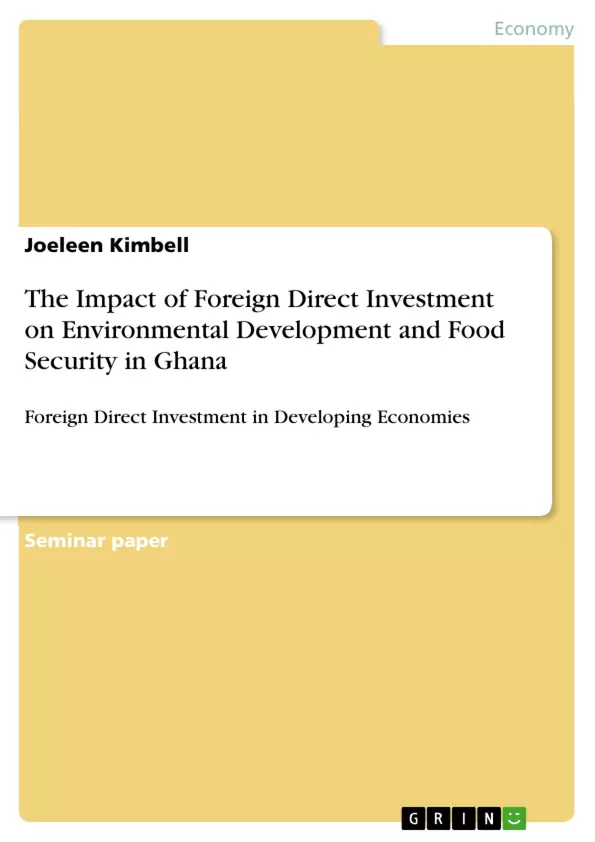This research paper examines the two-faced role of FDI in Ghana’s economy, environment, and food security. The research also explores the benefits of FDI in technology, infrastructure development and employment opportunities, especially in agriculture and renewable energy. However, it also looks at the negative impacts, including pollution of the environment, loss of forests, soil degradation, and social injustice, especially on farming communities reaping from small-scale farming. The study finds that FDI makes Ghana more competitive internationally, but in the long run, it causes pollution and food insecurity through the displacement of smallholder farmers. This study calls for more demonstration of commitment in formulating sound policies and regulation frameworks on sustainable development in Ghana to counter the adverse effects of FDI. In this way, the country will be able to fully utilize foreign investment while at the same time conserving its environment and feeding its people. The paper provides important suggestions for policymakers and stakeholders to refer to while developing future economic and environmental policies.
Inhaltsverzeichnis (Table of Contents)
- Introduction
- Research Question
- The Relevance of the Research Question
- The Positive Impacts on Environmental Development and Food Security
- The Negative Impacts on Environmental Development and Food Security
Zielsetzung und Themenschwerpunkte (Objectives and Key Themes)
This research paper investigates the multifaceted impact of Foreign Direct Investment (FDI) on Ghana's economic development, environmental sustainability, and food security. It aims to analyze both the positive and negative consequences of FDI, providing insights for policymakers and stakeholders involved in developing future economic and environmental policies for Ghana.
- The impact of FDI on Ghana's environmental development.
- The relationship between FDI and food security in Ghana.
- The positive contributions of FDI, such as technological advancements and infrastructure development.
- The negative consequences of FDI, including environmental pollution and displacement of smallholder farmers.
- Policy recommendations for sustainable development in Ghana.
Zusammenfassung der Kapitel (Chapter Summaries)
Introduction: This chapter provides background information on Ghana's economic transformation and the increasing role of FDI. It introduces the research question focusing on FDI's impact on environmental development and food security.
Research Question: This section clearly states the central research question guiding the study: How has foreign direct investment impacted environmental development and food security in Ghana?
The Relevance of the Research Question: This chapter discusses the significance of studying FDI's impact in the context of Ghana's sustainable development goals and challenges like poverty and food insecurity. It highlights the need to understand both the opportunities and threats posed by FDI.
The Positive Impacts on Environmental Development and Food Security: This section explores the positive effects of FDI, including the introduction of better technology and sustainable mining practices, investment in renewable energy, and capacity building for environmental protection. It also examines the potential benefits for food security through increased agricultural productivity and efficiency.
Schlüsselwörter (Keywords)
Foreign Direct Investment (FDI), Ghana, environmental development, food security, sustainable development, economic growth, environmental pollution, smallholder farmers, renewable energy, policy recommendations.
- Arbeit zitieren
- Joeleen Kimbell (Autor:in), 2024, The Impact of Foreign Direct Investment on Environmental Development and Food Security in Ghana, München, GRIN Verlag, https://www.hausarbeiten.de/document/1511731


